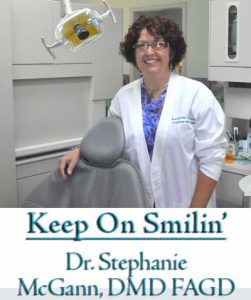By Dr. Stephanie McGann, DMD FAGD, Columnist, The Times
 Sometimes it just can’t be fixed. In today’s modern age of dentistry the “save it no matter what” attitude has been replaced by a more measured response. Sometimes it makes more sense to remove a tooth and place an implant than to do tons of work to “save” an already compromised tooth.
Sometimes it just can’t be fixed. In today’s modern age of dentistry the “save it no matter what” attitude has been replaced by a more measured response. Sometimes it makes more sense to remove a tooth and place an implant than to do tons of work to “save” an already compromised tooth.
There are a lot of reasons to replace a lost or missing tooth. It’s a questions dentists are asked every day. There are a lot of reasons. One of the most common reasons, especially in the front of the mouth is aesthetics. Very few people are OK with walking around with a missing front tooth. But a good looking smile is only part of the story.
Teeth are lost for a number of reasons. Sometimes tooth decay progresses to the point where a tooth can no longer be fixed. In those cases the tooth is removed to prevent pain and infection. By replacing the tooth we can minimize the loss of bone in that area and prevent the remaining teeth from shifting into a poor bite. Teeth have a purpose they are used for eating, communicating and smiling. Without teeth we may not be able to adequately chew and subsequently digest food appropriately. Missing several teeth may alter speech. Making it hard to pronounce certain words properly.
 An unfilled space may cause teeth to grow into that space leading to a bad bite, possible issues with the jaw joint, sensitivity, looseness or tenderness. Esthetically this may cause teeth to shift and look “crooked”.
An unfilled space may cause teeth to grow into that space leading to a bad bite, possible issues with the jaw joint, sensitivity, looseness or tenderness. Esthetically this may cause teeth to shift and look “crooked”.
Another reason to replace missing teeth is the tendency to have bone resorb if there is not biting forces being applied to it. This bone resorption can be minimized with the placement of an implanted tooth. The more the bone resorbs the more it can affect chewing or even appearance. Long time denture wearers sometimes develop a “sunken-in” appearance from the lost of alveolar (tooth supporting) bone.
Today teeth can be replaced quickly and easily with dental implants, fixed bridgework or conventional removable appliances. Your dentist can show you what options would work for your specific needs. It’s important to remember than leaving that space may cause problems over time.
Dr. Stephanie McGann, who has more than two decades of dental practice experience, is a resident of the Unionville area and owns and practices at Rainbow Valley Dental, in Valley. She is a past President of the Chester/Delaware Dental Society and she is a Fellow of the Academy of General Dentistry.




